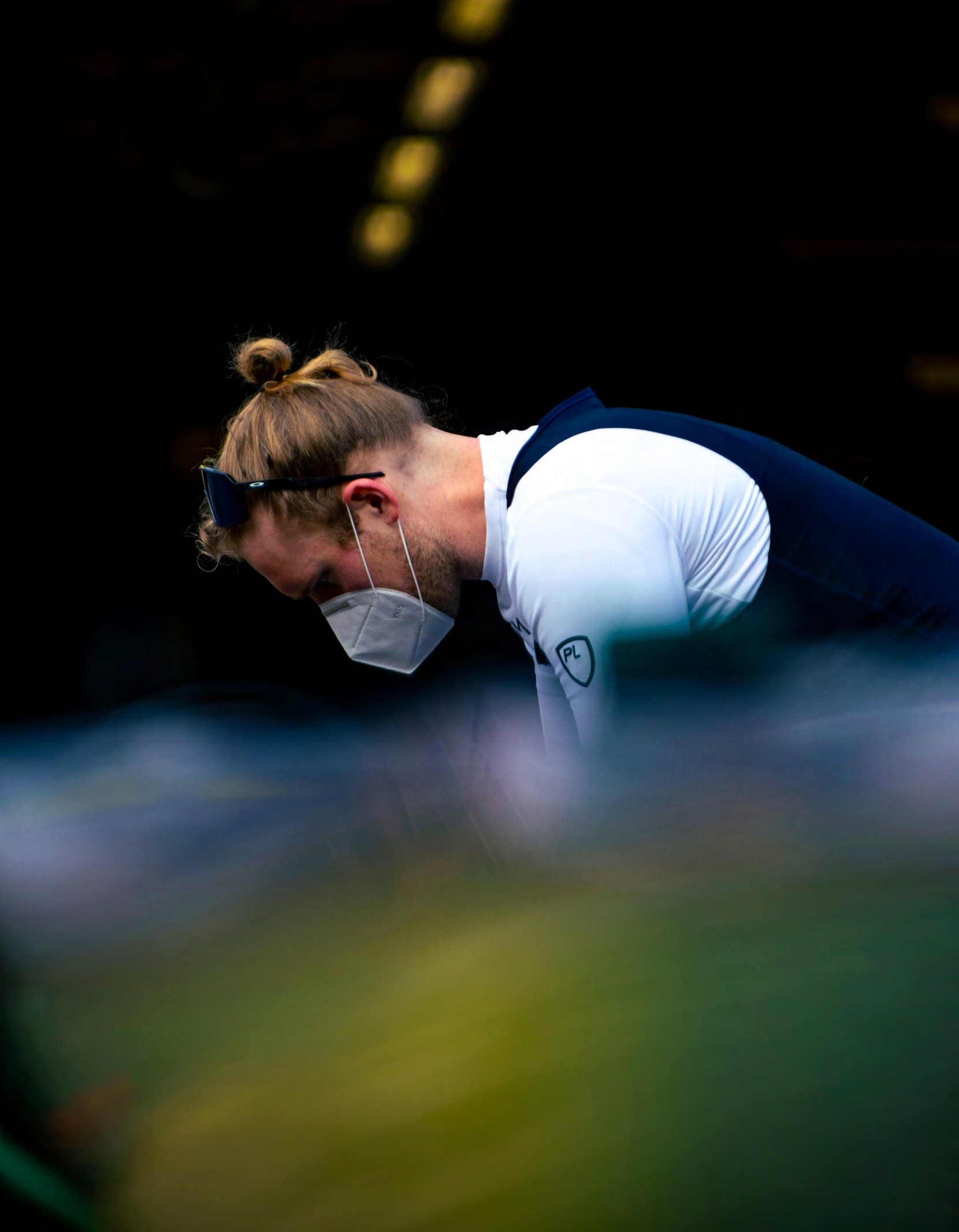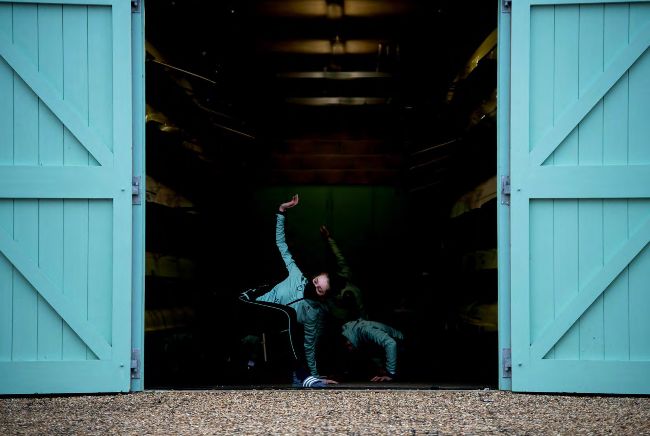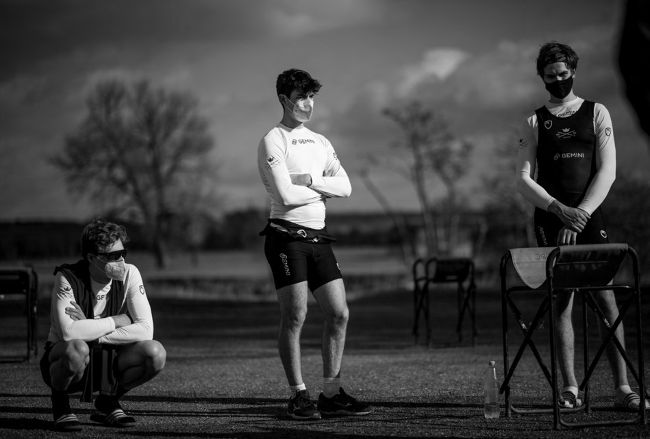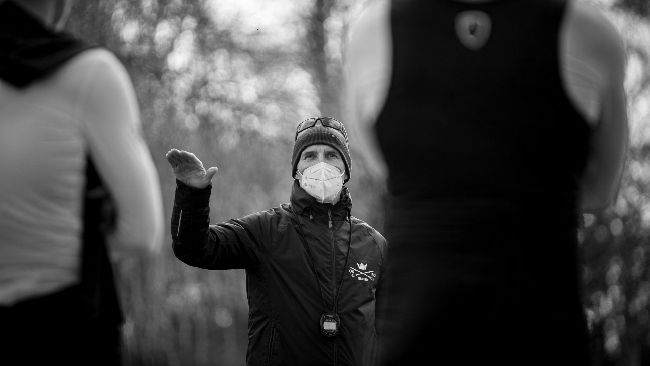FEATURE
A Fine Balance
Unlocking the perfect race with imperfect preparation
WORDS / TOM RANSLEY, DEPUTY EDITOR, ROW360

PHOTOGRAPHY / BENEDICT TUFNELL
Form guides for this year’s Oxford-Cambridge Boat Race will be based on scant information. With the 2020 Boat Race cancelled and the third UK national lockdown preventing any fixtures, this is truly an unpredictable affair. Nevertheless, the men and women of Oxford and Cambridge have continued to maximise their chances of victory in the wake of much turbulence.
The Boat Race athletes have completed a frightening number of miles on the ergo this season. They will not lack base fitness but delivering their hard-earned stamina in the race is not a given. Converting erg-watts into boat speed is a tough trick to pull off, especially with just four weeks of water work before the race.

Bronya Sykes at CUBC’s Ely boathouse.
In this article we examine some of the pitfalls and opportunities the crews faced this season. And unpick areas that might differentiate the eventual winners and losers.
Time in the boat is a precious commodity. Avoiding injury and illness is always a major concern, but the path to peak fitness is a treacherous one. The cumulative workload of daily ergometer sessions has to be survived but so too does the transition back to the water. The joy of escaping the erg and the enthusiasm to make up for lost time must be tempered by the elevated risk of injury.
Rowing is an asymmetrical movement on an unstable surface: erging is not. Time out of the boat switches off neural pathways and core muscles that help stabilise rowers when applying their power through the water. Moreover, the rotational movement of the rowing stroke is not replicated on the rowing machine.
It is a similar story for the feathering motion, and the general hardiness of the hands. Forearms and hands need time to readjust and classic injuries like tendonitis and tenosynovitis are a risk following a prolonged absence from the boat and even blisters can cause problems, especially if they get infected.
For Canadian Julia Lindsay of Oxford University Women’s Boat Club (OUWBC) the challenge is particularly great. Come race day, her total water time with the Oxford squad will be just four and a half weeks. Trial VIIIs was the first time she met her teammates, after a delayed visa application, travel quarantine and the second national lockdown delayed her arrival.

Felix Drinkall, Luke Robinson and Tobias Schröder at the OUBC boathouse.
It will be a steep learning curve for all the athletes jumping back in their boats, but the reward is an increase in boat feel and harmony. The task before them is to reconnect with their best technique and develop a clear sense of those around them in the boat. The athletes need to quickly re-learn how to listen to the hull and receive the feedback through their oars, seat and feet.
Oxford and Cambridge will both use their Trial VIIIs experience of switching quickly from land training to water racing. The Dark Blues had the least time to prepare before their internal pre-Christmas racing as The University of Oxford prevented an immediate return to student sporting activities after the second national lockdown.
Despite the imperfect preparation throughout the season, Head Coach of the Cambridge men, Rob Baker, is optimistic about the high standard his crew will achieve: “Everybody has got to understand what their job is and how they are going to achieve it. We might not have all the bells and whistles like normal, but we will be very close.”
The coaches have not had a lot of time to bring their crews together. Their aim is to make efficient crews that move well at speed. Despite virtual coaching through lockdown, erging in isolation can breed bad habits and disruptive foibles which are poison to a crew’s rhythm. Flopping about on an ergo will not necessarily impact the output, but in a boat erratic surplus movement is detrimental to hull speed and impinges on your crewmates’ ability to work. This year more than any other, the big, strong and agricultural athletes are unlikely to be given time to feel their way in. The coaches simply have not had time to polish their rough diamonds.
“Despite virtual coaching through lockdown, erging in isolation can breed bad habits and disruptive foibles which are poison to a crew’s rhythm.”
Psychology is another major factor at play in determining the outcome of the race. Sean Bowden said: “As much as the rowers enjoy their rowing, I think when you are younger you are generally more achievement-orientated – you are rowing because you want to win the Boat Race or whatever it is – and then everything is a necessary step towards that goal and if you remove the certainty of the goal it can put people in quite a difficult place. The goal is very important as to how they shape their behaviours. They found that hard...”
Across all the squads the mixed response to uncertainty is a common theme. This year’s athletes have shown tremendous capacity to adapt and find motivation. Those who are selected in the Blue Boats are probably the ones who did this the best.
The location of this year’s Boat Race presents a unique challenge for each side. For Cambridge, racing at Ely, on their home water, could be advantageous but may also have its drawbacks. There is a danger that turning up to Ely on Boat Race day will not feel like a ‘proper’ event. The same boathouse, the same stretch of river, and the same crowd-less riverbanks. Might it be all be a little underwhelming? Could it feel too normal? Will the Light Blues lack edge, energy and buzz? Raising your game on race day can be the difference between winning and losing. When the Cambridge crews go afloat it should be the Fens that are flat not their spirits. They have to push off from the dock, ready to do battle.
Or perhaps the familiarity is a competitive advantage. The Light Blues will have a second sense of where they are on the course and this will help dispel the panicky search for the finish line when their legs are screaming in the latter stages of the race. They ought to be more confident as they move down the course, section by section, and time their all-out effort as they approach the finish.

(Above) OUBC Head Coach Sean Bowden
For Oxford the location will feel foreign, and the Oxford coaches would prefer to have spent more days on the racecourse ahead of April 4th. Traditionally, Boat Race athletes spend many weekends training on the Championship Course and decamp to London the week before the Boat Race to accustom themselves to the Tideway. This year Oxford will miss the usual opportunities to rehearse and tally surroundings and landmarks to their race plan.
“Water is wet, it runs in a particular direction and there is wind,” Head Coach of OUWBC, Andy Nelder, quipped before explaining: “It would be nice to be there (Ely) beforehand, but we have to accept that it is what it is, and we are lucky to be racing at all. For all the problems we have had to deal with it is just another one and we will find our way around it as best we can.”
At the time of writing, the rowers at Oxford have only experienced the conditions at Ely during Trial VIIIs in December.
Sean Bowden was quick to spot how his athletes responded. He has experience of Ely’s Great Ouse River from his time coaching Cambridge ahead of the 1993 and 1994 Boat Races.
“The course is interesting. On the Tideway when you are racing and there is a tailwind, it is flat, but at Ely, when you get a tailwind, it is rough. It is a different experience, and we could see a few guys getting caught out. The wind builds down the course and the conditions can get quite lumpy at the end. I am glad we experienced it because that is the prevailing wind.”
“On the Tideway when you are racing and there is a tailwind, it is flat, but at Ely, it is rough. We could see a few guys getting caught out.”
At Ely, the pressure of being down on your opposition might well be more significant given that any disparity between boat speeds will not be attributed to the big corners on the Putney to Mortlake course. If you are down, it is because of boat speed, not distance travelled.
Nothing sharpens the senses like a sideby-side race, and it is impossible to truly replicate that experience in practice. Training pieces just aren’t the same. The dark art of race craft is usually honed by the fixture list preceding a Boat Race. Race savvy is an athlete’s alertness and understanding of the race situation, their ability to be switched on and tune in. All of the crews this year will be relying on somewhat rusty, somewhat dusty, innate race savvy. I expect at least one of the four crews will be caught napping off the start line and have their race stolen before they have even thought about pushing onto their rhythm.
But the rowers are certainly tough. They have bludgeoned out hour after hour on the ergo in kitchens, bedrooms and gardens, day in day out, more often than not alone. However, the mindset required to achieve that slightly masochistic feat differs from the one needed to produce a team win in a one-off match race on the water.
After speaking to the athletes, it is clear they are glad to be back on the water and with the assurance that the race will definitely happen. The elation of being free to row might well facilitate a positive mindset that trumps typical race day anxieties and thus unleashes their best performance. If either set of races are equally matched, with two crews on It is a different experience this ‘cloud nine’ high, it will be a glorious watch – in my experience, this type of mental readiness frees up the rowing and produces optimal performances.
Side by side eights at their best, blasting down the Ely straight, is sure to make a great event. No matter what the form book predicts.
Tom Ransley is a British Olympic gold and bronze medallist rower from the Rio 2016 and London 2012 Olympic Games. Before joining the GB Olympic team, Tom studied at Cambridge University and competed in two Boat Races for the Light Blues, where he suffered two gruelling defeats. Tom knows the race, and its challenges, inside out. Tom retired from the GB team in April 2020.